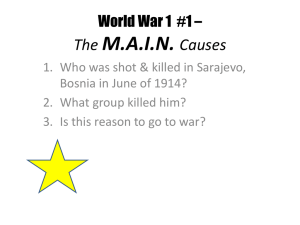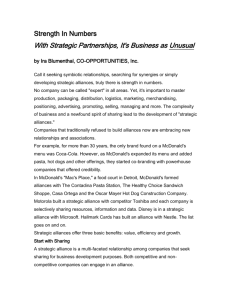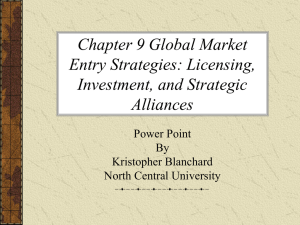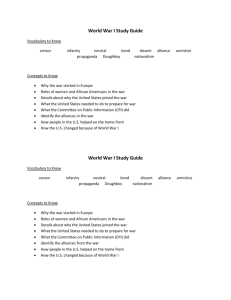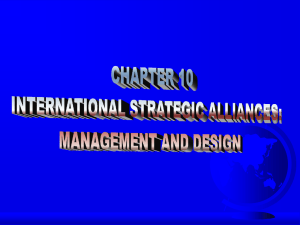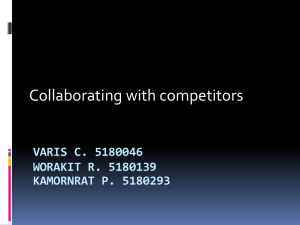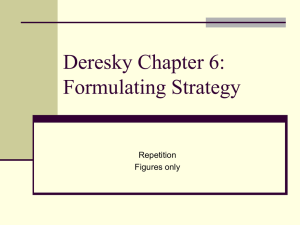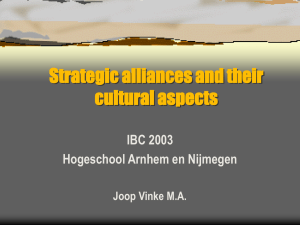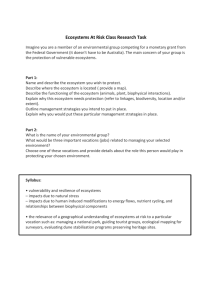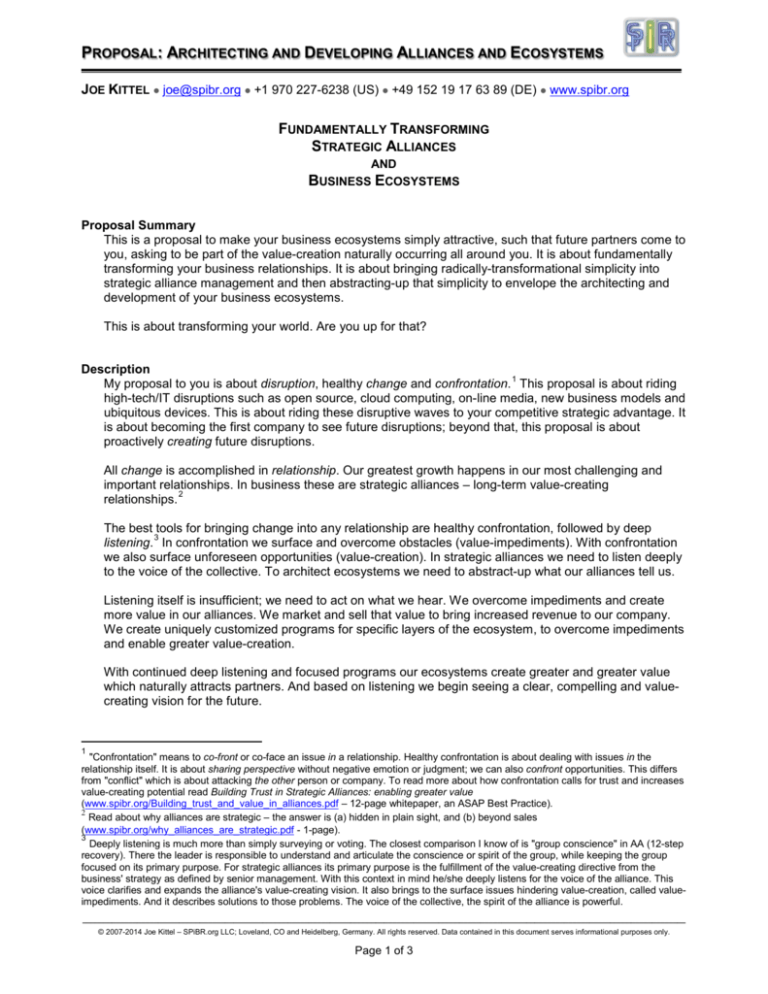
PROPOSAL: ARCHITECTING AND DEVELOPING ALLIANCES AND ECOSYSTEMS
JOE KITTEL ● joe@spibr.org ● +1 970 227-6238 (US) ● +49 152 19 17 63 89 (DE) ● www.spibr.org
FUNDAMENTALLY TRANSFORMING
STRATEGIC ALLIANCES
AND
BUSINESS ECOSYSTEMS
Proposal Summary
This is a proposal to make your business ecosystems simply attractive, such that future partners come to
you, asking to be part of the value-creation naturally occurring all around you. It is about fundamentally
transforming your business relationships. It is about bringing radically-transformational simplicity into
strategic alliance management and then abstracting-up that simplicity to envelope the architecting and
development of your business ecosystems.
This is about transforming your world. Are you up for that?
Description
1
My proposal to you is about disruption, healthy change and confrontation. This proposal is about riding
high-tech/IT disruptions such as open source, cloud computing, on-line media, new business models and
ubiquitous devices. This is about riding these disruptive waves to your competitive strategic advantage. It
is about becoming the first company to see future disruptions; beyond that, this proposal is about
proactively creating future disruptions.
All change is accomplished in relationship. Our greatest growth happens in our most challenging and
important relationships. In business these are strategic alliances – long-term value-creating
2
relationships.
The best tools for bringing change into any relationship are healthy confrontation, followed by deep
3
listening. In confrontation we surface and overcome obstacles (value-impediments). With confrontation
we also surface unforeseen opportunities (value-creation). In strategic alliances we need to listen deeply
to the voice of the collective. To architect ecosystems we need to abstract-up what our alliances tell us.
Listening itself is insufficient; we need to act on what we hear. We overcome impediments and create
more value in our alliances. We market and sell that value to bring increased revenue to our company.
We create uniquely customized programs for specific layers of the ecosystem, to overcome impediments
and enable greater value-creation.
With continued deep listening and focused programs our ecosystems create greater and greater value
which naturally attracts partners. And based on listening we begin seeing a clear, compelling and valuecreating vision for the future.
1
"Confrontation" means to co-front or co-face an issue in a relationship. Healthy confrontation is about dealing with issues in the
relationship itself. It is about sharing perspective without negative emotion or judgment; we can also confront opportunities. This differs
from "conflict" which is about attacking the other person or company. To read more about how confrontation calls for trust and increases
value-creating potential read Building Trust in Strategic Alliances: enabling greater value
(www.spibr.org/Building_trust_and_value_in_alliances.pdf – 12-page whitepaper, an ASAP Best Practice).
2
Read about why alliances are strategic – the answer is (a) hidden in plain sight, and (b) beyond sales
(www.spibr.org/why_alliances_are_strategic.pdf - 1-page).
3
Deeply listening is much more than simply surveying or voting. The closest comparison I know of is "group conscience" in AA (12-step
recovery). There the leader is responsible to understand and articulate the conscience or spirit of the group, while keeping the group
focused on its primary purpose. For strategic alliances its primary purpose is the fulfillment of the value-creating directive from the
business' strategy as defined by senior management. With this context in mind he/she deeply listens for the voice of the alliance. This
voice clarifies and expands the alliance's value-creating vision. It also brings to the surface issues hindering value-creation, called valueimpediments. And it describes solutions to those problems. The voice of the collective, the spirit of the alliance is powerful.
________________________________________________________________________________________________________________________________________________
© 2007-2014 Joe Kittel – SPiBR.org LLC; Loveland, CO and Heidelberg, Germany. All rights reserved. Data contained in this document serves informational purposes only.
Page 1 of 3
PROPOSAL: ARCHITECTING AND DEVELOPING ALLIANCES AND ECOSYSTEMS
JOE KITTEL ● joe@spibr.org ● +49 152 19 17 63 89 (DE) ● +1 970 227-6238 (US) ● www.spibr.org
The future will have disruptions. However, as we see these disruptions more clearly, we will deal with
them more effectively. We will proactively disrupt how alliances are managed and how ecosystems are
developed via simplicity, confrontation and deep listening; this will create a positive feedback loop.
Ecosystem management becomes a virtuous cycle of change-begets-change and so our business will
grow in a highly-sustainable manner.
Primary Phases
• Do the Impossible. Assign to me the impossible. Let me work on your most challenging, complex
4
and dysfunctional strategic alliance. I will transform it via the power in simplicity.
• Simplify. Let me bring transformational simplicity into the most difficult area (layer) of your most
TM
important ecosystem. By applying the 2-Slide Methodology to a representative sampling of
alliances in that layer we will be able to define processes and develop programs which will overcome
5
value-impediments and create more incremental value in that area of your ecosystem.
• Empower. Let me empower your strategic alliance managers to consider a uniquely bold
6
perspective on their role; they can become transformational strategic alliance managers. The most
empowering practice a strategic alliance manager can embody is the counter-intuitive practice of
7
8
self-obsolescence. And there are other empowering practices for alliance managers to consider.
TM
• Architect. Continue applying the 2-Slide Methodology to other alliances in that ecosystem; this will
naturally re-architect those alliances. Then based on a sampling of alliances in specific areas of the
ecosystem we will create unique programs or processes to overcome value-impediments and create
incremental value. An action-oriented architecture for the ecosystem will continue emerging.
• Repeat. Do this in your other alliances and ecosystems.
Results
• More empowered strategic alliance managers.
• Greater alignment and focus in alliance teams.
• Increased value-creating effectiveness.
• Substantively differentiated go-to-market collateral.
• Significantly more revenue from your alliances.
• More attractive ecosystems with easier and simpler value-creation.
• Greater linkage from strategy to alliances and vice versa.
• Business relationships and ecosystems become sources for healthy strategic disruption.
4
The 2-Slide MethodologyTM (www.spibr.org/2-slide_methodology.pdf – 27-page whitepaper) is based on 30 years of research at the
Program on Negotiation at Harvard Law, MIT and Tufts Universities. It is grounded in 25 years of real-world experience. In this
whitepaper are real-world examples of "doing the impossible" in the HP/Microsoft and HP/SAP alliances. This methodology is about
simplifying complexity and neutralizing drama via deeply listening to the voice of the collective. It is about the transcendental and
transformational power of shared light. It brings clarity, alignment and focus into teams. The content created by this methodology is
completely leverageable throughout all phases of alliance development and to any audience, situation, system, process or methodology.
In the HBR article Simple Rule for Making Alliances Work is an illustration of the practical use of the value-impediments slide in a coselling situation in the HP/Microsoft alliance (www.spibr.org/HBR_Simple_Rules_for_Making_Alliances_Work.pdf – see pages 5-6).
5
Read Section 4.7 – Business Ecosystem Management in the 2-Slide MethodologyTM whitepaper referenced in the prior footnote.
6
Obviously not all strategic alliance managers are interested in being transformed. For those who are I offer training (group discussion)
and coaching (being a "sounding board") on the role (www.spibr.org/strategic_alliance_manager_role.pdf – 34-page whitepaper) and on
being a transformational alliance manager (www.spibr.org/Change_Your_Alliance.pdf – (18-page whitepaper).
7
Read www.spibr.org/self-obsolescence.
8
Check out www.spibr.org/transformational-practices.
________________________________________________________________________________________________________________________________________________
© 2007-2014 Joe Kittel – SPiBR.org LLC; Loveland, CO and Heidelberg, Germany. All rights reserved. Data contained in this document serves informational purposes only.
Page 2 of 3
PROPOSAL: ARCHITECTING AND DEVELOPING ALLIANCES AND ECOSYSTEMS
JOE KITTEL ● joe@spibr.org ● +1 970 227-6238 (US) ● +49 152 19 17 63 89 (DE) ● www.spibr.org
Why Me?
There is no one else in the world with my focus, breadth of experience, depth of insight, clarity of thinking,
9
purposeful passion, persistence and tenacity.
I bring to you:
10
• 25 years of experience in strategic alliances: 16 years doing this work, 9 years consulting.
11
• An entire career focused on value-creation, throughout the high-technology ecosystem.
• Exceptional intelligence – BS in Electrical Engineering, semiconductor physics, magna cum laude.
Bringing an engineering approach to strategic alliances, addressing the fundamental issues – poor
12
relationships, low trust and climates unhealthy for collaboration.
• Clearly demonstrated breakthrough thinking with a published book and five whitepapers, endorsed
13
by professional organizations, thought leaders and major corporations.
• The artful science of strategic alliance management taken to a higher-level:
o I bring practical spirituality into this work because it is called for in order to deepen
relationship, improve trust and change the atmosphere.
o Based on the transformational power in simplicity, business ecosystems are easier to
architect and they naturally become more value-creative.
• The healthy use of confrontation and deep listening as tools to: improve trust, surface new
opportunities, see future value-creating visions, face challenging issues and find solutions.
Call to
•
•
•
•
Action
Think about it.
Let's talk.
Discuss this proposal with your strategic alliance managers who have substantial experience.
Move forward, disrupting your world for your sustained competitive advantage.
This is about radically-simplifying alliancing, then ecosystems, thus increasing value-creation and making
your ecosystems more attractive. It is simply more profitable to work in your ecosystems than anywhere else.
I do the impossible with nothing in the eye of a hurricane. This is what strategic alliance managers do.
Joe Kittel
Strategic Alliance Manager ~ Business Ecosystem Architect
joe@spibr.org ● +1 970 227-6238 (US) ● +49 152 19 17 63 89 (DE) ● www.spibr.org
Loveland, CO and Heidelberg, Germany
9
Read about the value I offer you at www.spibr.org/value_proposition.pdf (3 pages).
Refer to www.spibr.org/Joe_Kittel_resume.pdf and www.spibr.org/endorsements.
11
Read www.spibr.org/Joe_Kittel_cover_document.pdf a 5-page document on a life of value-creation.
12
Within high-tech/IT roughly two-thirds of all strategic alliances fail to achieve their value-creating potential, mostly due to relationship
issues. Ref: Managing Alliances for Business Results: Lessons Learned from Leading Companies by Jeff Weiss, Sara Keen and Stuart
Kliman; Vantage Partners, LLC. A 2006 study of alliancing in 93 companies from various industries: healthcare, high-technology
(computers & IT), manufacturing, pharmaceuticals and professional services.
13
Checkout the following: my book – www.spibr.org/books; whitepapers – www.spibr.org/whitepaper; and endorsements –
www.spibr.org/endorsements.
10
________________________________________________________________________________________________________________________________________________
© 2007-2014 Joe Kittel – SPiBR.org LLC; Loveland, CO and Heidelberg, Germany. All rights reserved. Data contained in this document serves informational purposes only.
Page 3 of 3

